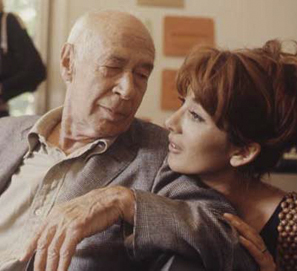Stefan Zweig
(Hölderlin - Kleist- Nietzsche)
"... en todo hombre superior, y más especialmente si es de espíritu creador, se encuentra una inquietud que le hace marchar siempre hacia adelante, descontento de su trabajo..."
"... Siempre es la inquietud el primer síntoma de ese poder del demonio..."
"... y la inspiración llega inconscientemente del misterioso más allá y está por encima de nuestra ciencia..."
"... No ignora cuán fácil es ser feliz si uno tiene un corazón superficial..."
"... el heroísmo de un hombre encuentra el mayor peligro en los seres que más lo quieren..."
"... Así como el hombre necesita lo divino para no morir, lo divino necesita al hombre para ser realmente divino..."
"... Sólo llegará a ser verdadero héroe aquel que abandone su cómodo hogar para lanzarse en el torbellino de la tormenta..."
"... todo sistema es siempre un muro..."
"A pesar de todo, los débiles son arrastrados por el destino."
"... <<La libertad, para quien sabe lo que esta palabra significa, es algo lleno de profundidad>>..."
"... el dolor del genio es un dolor más alto..."
"... He gozado ya de lo que hay de agradable en este mundo; los placeres de la juventud se han ido. ¡Oh, cuánto tiempo hace! Se fueron ya abril, mayo y junio; ahora ya no soy nada; ya no me gusta vivir..."
"... porque cuando es el demonio el que arrastra, no permite el calor del hogar ni la protección del techo..."
"... Para poder destruir a ese demonio interior que los domina, no pueden hacer nada más que destruirse a sí mismos..."
"No sé lo que te he de decir acerca de mí, pues soy una persona inefable."
"... Todos lo que tratan de estar a su lado retroceden ante su demonio interior..."
"... Los que lo conocían le creían frío e indiferente; pero los que lo tratan temen el incendio interior que le consume..."
"... Sólo el demonio le fue fiel..."
"... sabe que quien está cerca de él corre peligro de chamuscarse en las llamadas de su pasión..."
"... cada hombre debería tener un plan de vida..."
"... Mientras un hombre no sea capaz de formarse un plan de vida, seguirá siendo un menor y habrá de estar sujeto a la tutela de los padres o de la fatalidad..."
"... no sería alemán si no lo esperar todo del estudio..."
"... <<Nosotros nunca podremos afirmar si eso que llamamos verdad es verdad o sólo nos lo parece>>..."
"... <<¡Ah!, la ambición es un veneno que emponzoña todas las alegrías.>>..."
"Si quieres sentir la satisfacción de tu propio mérito, debes conceder mérito al mundo.[Goethe]"
"El interés que despierta en mí un filósofo depende exactamente de su capacidad para darnos un ejemplo."
"Vivir de un modo peligroso es el mayor placer que puede dar la existencia."
"En énfasis en el gesto no es porpio de la grandeza; quien necesita del gesto, es falso... Desconfiemos de todas las personas pintorescas."
"... el psicólogo sufre doblemente, porque vive dos veces su dolor: una vez, en la realidad, y otra vez, en la auto observación..."
"... La psicología, la intelectualidad, arrastran con fuerza al hombre sensible hacia el sufrimiento y hacia el desespero; pero también sólo por la psicología, por el espíritu, puede volver a la normalidad..."
"... Todos los conocimientos lo atraen y ninguno lo sujeta..."
"... es un tentador que es tentado continuamente por la tentación de tentar..."
"... Nietzsche está maldito, está condenado a pensar continuamente..."
"...<<Uno ama algo y, apenas ese algo se convierte en un amor profundo, el tirano que llevamos dentro (que podríamos llamar nuestro <<yo>> superior) dice: eso es precisamente lo que te pido en sacrificio. Y, en efecto, lo sacrificamos, pero no sin ser torturados a fuego lento.>>..."
"... nunca el estudio de los valores poseyó un aparato de precisión tan exacto, tan sublime, como Nietzsche..."
"... Nietzsche no quiere jamás, en ningún caso, ser feliz, sino sincero..."
"... La vida es, al fin y al cabo, conciliación, indulgencia..."
"... una forma esencialmente poética a una vida que, en esencia, es prosaica..."
"... como en todos los caracteres demoniacos, cada vez hay más fuego en su pasión, más impaciencia; cada vez es más tempestuoso, más revolucionario, más caótico..."
"... A los treinta años, edad en que el hombre normal empeiza a convertirse en un reposado burgués..."
"... el hombre sabio y ordenado sólo acepta aquello que su naturaleza puede aprovechar..."
"... La música penetra siempre con más fuerza en los hombres sacudidos por la pasión, debilitados y sometidos a tensiones violentas o desgarrados en lo más íntimo de su ser..."
"... La música (¿quién no lo ha experimentado?) necesita que uno esté predispuesto a recibirla, sumido en una especie de languidez femenina, para poder fecundar un sentimiento..."
"... Porque por las naturalezas trágicas tomamos conciencia de la profundiad del sentimiento. Y" sólo gracias a los desmesurados conoce la humanidad su última dimensión."

